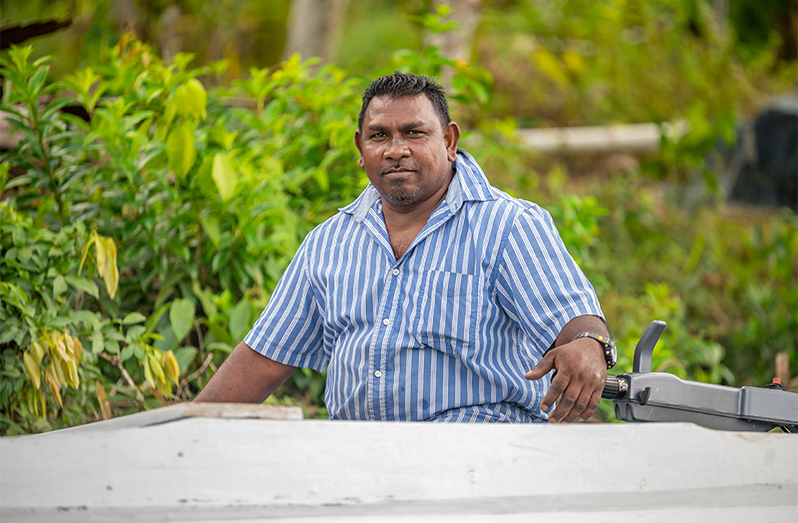DIANAND Sookdeo is a Nibbi furniture maker who mastered the skill over time. His talent is also his only source of income as a resident of Upper Bonasika Creek, Essequibo River.
The 54-year-old told the Pepperpot Magazine that his journey of Nibbi furniture-making started 10 years ago.
He had a friend who was gifted in that trade and he learned a few things from him and over time, he began observing the art and he became intrigued and decided it was what he wanted to do.
It took some time before he could master the art of plaiting Nibbi to make rocking chairs, settees and tables.
The father of five reported that the Amerindians are gifted in this art and it is not an easy skill to harness, but he managed to do so over time and today, he is earning from it.
Sookdeo would make Nibbi furniture based on orders received and it would take a few days to deliver the final product via his speedboat to the Hubu Koker or Parika.
He explained that he would have to go and source the Nibbi, a hemi-epiphytic plant from the Manaka River or Goat Creek, Essequibo River, in his boat and that takes time then he would have to air dry it before using it to make furniture.
It is said that nibbi attaches itself to trees, but are rooted in the ground by aerial roots. The long, straight free-hanging roots are considered suitable for weaving, making it flexible for making long-lasting furniture.
Since the roots of nibbi can be collected without killing the plant, it is considered to have great potential as a non-timber forest product, which can be sustainably utilised.
After harvesting, new roots take about five years to grow back to the soil. After collection, the “rope” is immersed in water to keep it bendable until use.
Once ready to be used, the outer bark is peeled off and the root is slit into long strips. Roots are harvested domestically and used for weaving baskets, tying thatches on roofs and making furniture.
Nibbi is one of the raw materials (along with Kufa, Clusia spp) necessary for producing the attractive wicker-type nibbi furniture, which supports a small but profitable furniture industry in Guyana and likewise, visitors prefer that type of locally hand-made furniture crafted from scratch.
Sookdeo told the Pepperpot Magazine that he would also have to source the Kufa vine to make his nibbi furniture, which is often in the same location.
He related that Kufa takes a week to air dry and nibbi furniture making is a long, complicated process that takes time, precision, and a high level of skill.
Sookdeo added that he would get help from his wife, Savita Ramkarran, to assist him whenever he has a large order of more than one piece of furniture.
The Upper Bonasika resident stated that he would try his best to give the customer what they desire in terms of design, style and pattern and it takes days to produce the final product.
The grandfather of five said he is glad to have such an extraordinary talent he can utilise to make his family comfortable.
“I am pleased that I don’t have to buy much materials to make nibbi furniture because it is made out of vines found in the natural environment and the hardest part is the actual making of nibbi furniture, which is precise and requires skills and talent,” he said.
Sookdeo told the Pepperpot Magazine that he moved from Crane, West Coast Demerara to Bonasika Creek, Essequibo River, when he was four years old with his family and has been residing there ever since.
He explained that he was a farmer and after losing his entire cultivation during the flood, he cannot financially re-plant and is seeking to re-start, but after he has saved enough money to do so.
He used to cultivate ground provisions and with a low-interest loan he will be able to start a crop on his farmlands.
Sookdeo added that in his spare time, he would go to the savannah area by the five-door koker at the edge of the village to catch sweet-water fishes which he would sell.
“To earn honestly there is no shame in doing things like catching fish, making nibbi furniture or being a farmer because when you are hungry no one will feed you,” he said.



.jpg)










